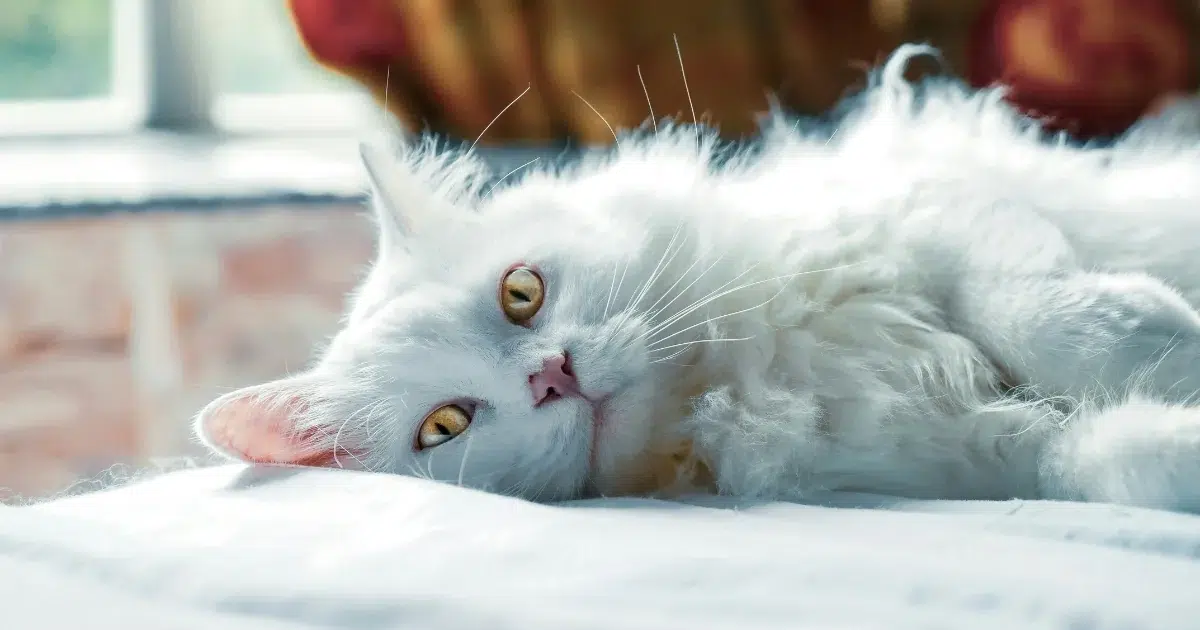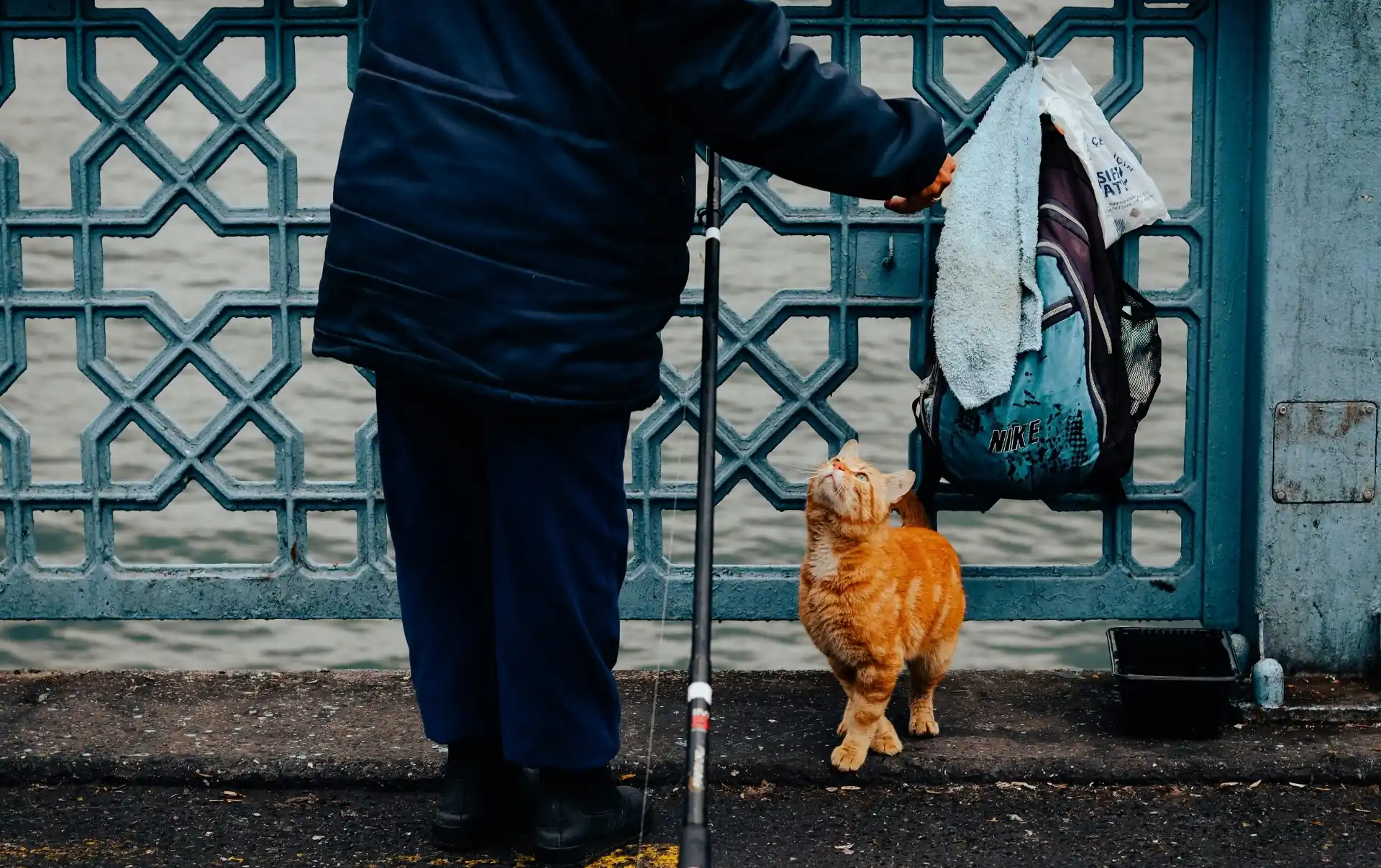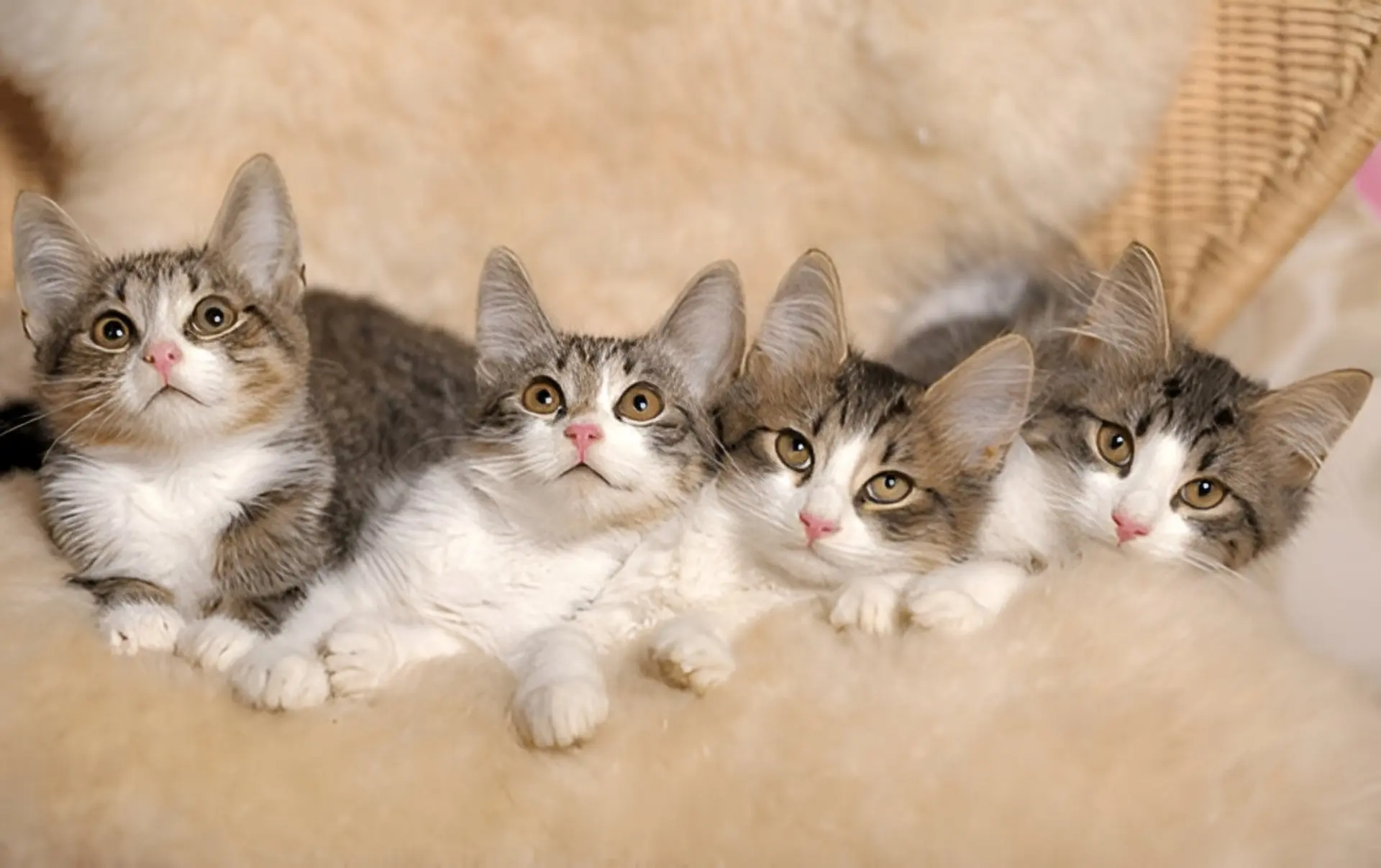Why Does My Cat Cry at Night : As a cat owner, you might find it puzzling when your cat cries or meows a lot at night. This behavior can be frustrating and worrying for many pet owners. But, knowing why cats cry at night can help us care for them better.
Cats are naturally active at night, unlike humans. This difference in sleep patterns can cause problems. Your cat might cry for attention, emotional support, or because of physical needs. Their cries can mean different things, and we need to understand them.
Table of Contents
Key Takeaways
- Cats are naturally nocturnal, leading to sleep schedule mismatches with their owners.
- Nighttime cat crying can be a sign of various needs, from attention-seeking to physical discomfort.
- Understanding the underlying reasons for your cat’s night cries is crucial for addressing the issue effectively.
- Providing a comfortable environment and establishing a consistent nighttime routine can help minimize excessive nighttime vocalization.
- Consulting a veterinarian is recommended if the crying persists or is accompanied by other concerning behaviors.
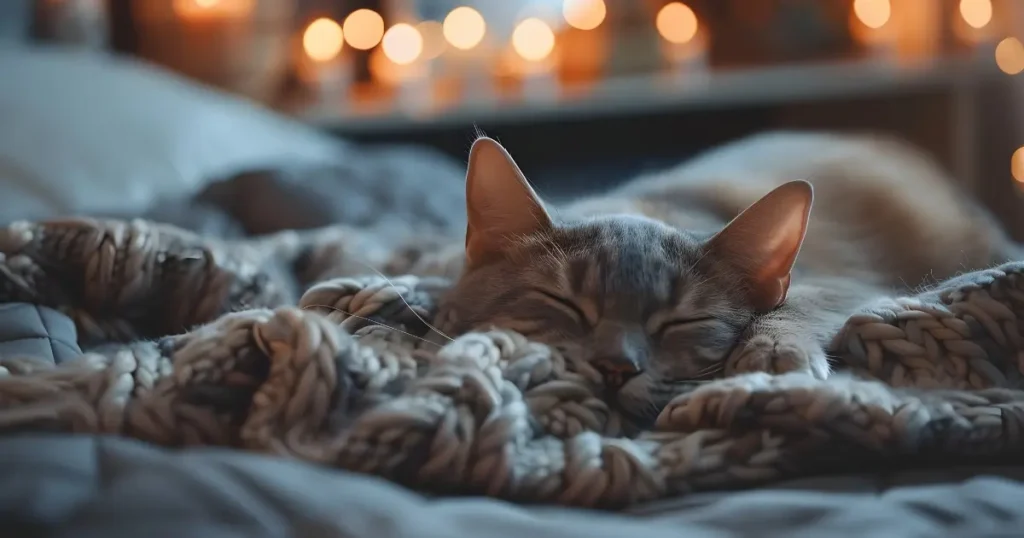
Understanding Nighttime Cat Crying: A Common Concern
As a cat owner, you might have seen your cat meowing a lot at night. This behavior can worry you. But, it’s key to know why your cat is making these sounds.
Differentiating Between Normal and Problematic Crying
Cats are naturally active at night, unlike humans. Sometimes, they meow during the night, which is normal. But, if they meow a lot or seem upset, it might mean there’s a problem.
The Impact of Nocturnal Nature on Cat Behavior
Cats are most active at night and early morning. They sleep a lot during the day. This means they might meow more at night, looking for attention or food.
Signs of Distress vs. Natural Communication
- If your cat meows loudly and keeps it up, it could mean they’re upset or have a health issue.
- But, some cat sounds meowing or chirping at night are just their way of talking. It doesn’t always mean they’re distressed.
Knowing when your cat’s night sounds are normal and when they’re not can help. It lets you know when to worry and when to just listen.
Why Does My Cat Cry at Night: Common Reasons Explained
If your cat is waking you up with meowing at night, you’re not alone. Cats often meow and cry at night for different reasons. Knowing the common causes can help you meet your cat’s needs.
One big reason is hunger or thirst. Cats are natural hunters and eat at night. If they eat early, they might meow loudly for more food.
Another reason is they want attention. Cats love to be with their owners. If they feel ignored, they might cry loudly to play or cuddle.
- Changes in temperature, lighting, or noises can also make them meow at night.
- Hormonal changes and breeding cycles can make them meow more too.
- Stress, anxiety, and health issues can also cause excessive meowing at night.
Figuring out why your cat cries at night is the first step. By knowing the cause, you can meet their needs and make your home quieter.
“My cat meows all night long, and it’s driving me crazy! I just want to get some sleep.”
If your cat’s nighttime meowing keeps you awake, see a vet. They can check for health issues and find ways to help your cat.
Medical Conditions That May Cause Nighttime Vocalization
Kittens cry and meow to talk to their humans. But, adult cats crying at night might mean they’re sick. Knowing about health issues and age changes is key to caring for your cat.
Physical Health Issues to Watch For
Some health problems like joint pain or dental issues can hurt your cat. This pain might make them cry at night. Look for signs like limping or changes in litter box use to spot health issues.
Age-Related Changes in Cat Behavior
Older cats might sleep less and meow more at night. They could also get sick with things like hyperthyroidism. These issues can make them cry more at night.
When to Consult a Veterinarian
If your cat cries a lot at night, see a vet. They can check your cat and find out why they’re crying. This is especially true if your cat’s behavior changes.
Knowing about health problems can help you care for your cat better. This way, you can make sure they’re happy and healthy.
The Role of Hunger and Thirst in Nighttime Meowing
If your cat’s nighttime meowing is keeping you up, it might be hunger or thirst. Cats are naturally active at night. They may meow if they’re hungry or thirsty.
One common reason for nighttime meowing is an empty stomach. Cats eat fast and may cry for a snack if their last meal was too early. Changing their feeding times and amounts can help.
Not having enough water can also make a kitten’s cry at night. Make sure your cat always has clean, cool water. You can also put extra water bowls around your home to help them stay hydrated.
“Addressing your cat’s basic needs for food and water can go a long way in reducing nighttime meowing.”
Understanding how hunger and thirst affect your cat’s night can help. You can make your home quieter and more comfortable for both you and your cat.
Attention-Seeking Behavior and How to Address It
Cats are naturally social and often meow to get attention from their owners. This is especially true at night when they might want more interaction. Knowing your cat’s need for attention is key to solving this issue.
Understanding Your Cat’s Need for Interaction
Cats have different social needs, and some need more attention than others. Kittens meowing sound is a way for them to ask for attention and bond with their caregivers. Even as cats get older, they still want quality time with their owners.
If your cat is meowing while playing with a toy, it’s their way of inviting you to play. Cats are natural hunters. Giving them interactive toys and games meets their instinctual needs for mental and physical stimulation.
Creating Healthy Boundaries
- Set a regular routine for feeding, playtime, and affection to make your cat feel secure and happy.
- Don’t give in to your cat’s demands for attention at night. This can make the behavior worse.
- Give your cat a cozy, separate sleeping area to encourage them to rest independently.
- Use interactive toys and puzzle feeders to keep your cat busy during the day. This can reduce nighttime meowing.
By understanding your cat’s need for attention and setting healthy boundaries, you can reduce cat meowing noises at night. This will help you have a better relationship with your feline friend.
Environmental Factors That Trigger Night Crying
As cat owners, we’ve all faced the challenge of our cats crying at night. Some meowing is normal, but certain things can make it worse. Knowing what causes it helps us make our homes quieter and more peaceful.
Noise is a big problem. Cats hear very well, and loud sounds can scare them. This leads to them meowing loudly. Keeping it quiet at night helps a lot.
Temperature also plays a role. Cats like it between 65-75°F. If it’s too hot or cold, they might meow to get out. Keeping their sleeping area at a steady temperature helps.
Lastly, unfamiliar surroundings can upset cats. They might meow if they’re in a new place. Making their space cozy and introducing new places slowly helps.
By tackling these issues, we can make our homes quieter and more peaceful. This helps both cats and humans sleep better.
“A calm environment is key to reducing nighttime cat crying. Pay attention to noise, temperature, and familiarity of surroundings to provide your cat with the comfort they need.”
The Impact of Breeding Cycles on Cat Vocalization
Cat sounds can change with their breeding cycles and hormones. Cats that haven’t been spayed or neutered tend to vocalize during mating season. They might meow at the door or crouch and meow to find a mate and show they’re ready.
Understanding Mating Calls
Both male and female cats that haven’t been fixed might meow loudly and often. They do this to show they’re ready to mate. Even older cats might do this, as their hormones can change with age.
Benefits of Spaying and Neutering
Spaying or neutering your cat can help with loud meowing. It stops the hormonal drive behind these calls. This means your cat won’t meow at night and won’t roam or fight as much.
“Spaying and neutering not only curbs disruptive vocalizations, but also provides significant health benefits for cats.”
Spaying or neutering can make your cat happier and quieter. This makes your home a nicer place for both you and your cat.
How Stress and Anxiety Affect Your Cat’s Night Behavior
When night falls, your cat might start meowing or crying. This could mean they’re stressed or anxious. It’s key to understand how stress and anxiety affect your cat’s night behavior to care for them well.
Cats are very sensitive and their surroundings affect their mood. Sudden changes, loud noises, or new family members can stress them out. They might meow or cry more at night, looking for comfort and attention.
“Stress and anxiety can be a major driver of nighttime vocalization in cats. By addressing the root causes of stress, you can create a more calming environment and reduce these disruptive behaviors.”
To help your cat, find out what stresses them and make their night calm. Give them lots of play and love during the day. Keep a regular routine and make sure they have cozy places to rest and hide. By meeting their emotional needs, you can lessen stress-related night crying and help them sleep better.
Every cat is different, so what works for one might not work for another. Watch your cat closely and talk to your vet if the meowing doesn’t stop or if there are other worrying signs. With patience and the right approach, you can help your cat feel less stressed and anxious, making nights peaceful for everyone.
Creating a Comfortable Night Environment for Your Cat
Creating a cozy night environment is key to stopping your cat’s crying at night. By meeting their needs and likes, you can make them feel safe and calm. This leads to a peaceful night for both of you.
Essential Elements of a Cat-Friendly Space
A cat-friendly night space should have a few important things:
- Soft, comfy bedding for your cat to curl up in
- Hiding spots or vertical structures, like cat towers or shelves, for safety
- Fun toys and puzzles to keep your cat’s mind busy at night
- Access to fresh water and a bit of food to stop hunger meowing
Temperature and Lighting Considerations
Cats are sensitive to temperature and light changes, which can make them meow at night. Keep the room temperature between 65-75°F (18-24°C). Also, provide the right lighting:
- Dim, indirect lighting or nightlights for a soothing sleep environment
- Stay away from bright, overhead lights that mess with their sleep cycle
- Use blackout curtains or shades to block out too much outdoor light
By making a cozy, cat-friendly space, you can cut down on night meowing. This ensures your cat gets a good night’s sleep.
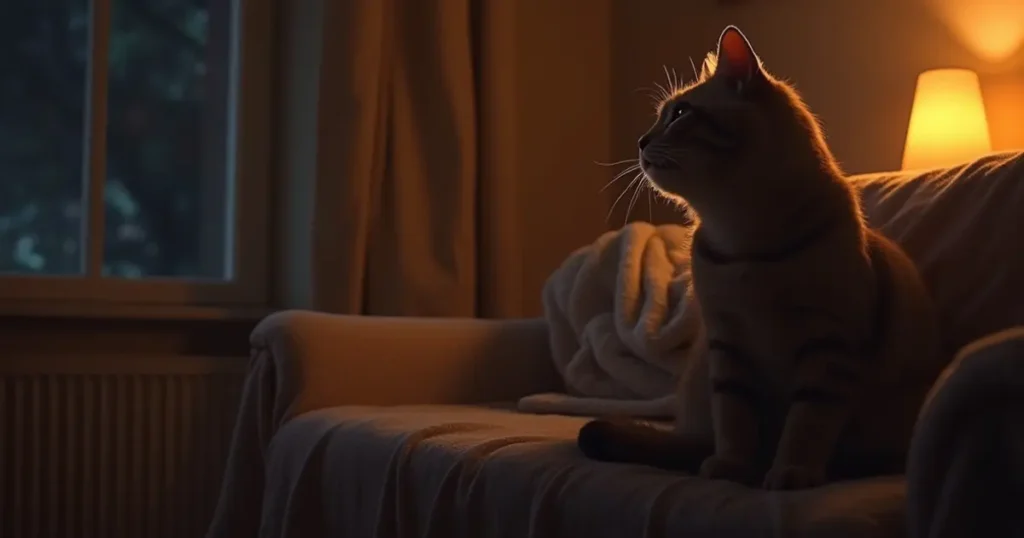
Establishing a Consistent Nighttime Routine
Creating a consistent nighttime routine can really help with why is my cat’s meow raspy, cats screaming, and how to stop a cat in heat from meowing or cat can’t meow problems. Cats love knowing what’s going to happen next. A good bedtime routine can calm them down and stop them from meowing too much at night.
Begin by setting a specific time for your cat’s evening activities. This could be playtime, feeding, or just relaxing together. Play with your cat early in the evening to burn off energy. This way, they’ll be more relaxed when it’s time for bed.
- Make sure your cat eats at the same time every day. This helps prevent why is my cat’s meow raspy or cats screaming.
- Do calming activities like grooming or giving them a treat-filled toy. This helps them get ready for sleep.
- Keep the room quiet and dimly lit before bed. This tells your cat it’s time to calm down.
By sticking to a routine, your cat will feel safer and less likely to meow too much. Remember, being consistent is crucial for a good nighttime routine for your cat.
“A consistent nighttime routine can do wonders for reducing why is my cat’s meow raspy and other disruptive behaviors in cats.”
Training Techniques to Reduce Night Crying
As a cat owner, you might have heard your cat kittens meow or cat drinking a lot of water and meowing at night. But, with the right training, you can make this stop. This will help your cat feel safe and sound.
Positive Reinforcement Methods
Positive reinforcement is a great way to change your cat’s behavior. It means rewarding them for good actions, like being quiet at night. Why my cat can’t meow might be because they don’t get enough positive feedback. Here’s how to help:
- Give your cat treats or praise when they’re quiet at night.
- Play with your cat in the evening to help them relax.
- Make sure your cat has a cozy place to sleep that they like.
Breaking Unwanted Habits
If your cat kitten crying sounds at night, you need to find out why and stop it. Here are some steps:
- Don’t react to your cat’s night cries to avoid making it worse.
- Change when you feed and play with your cat to match their natural rhythm.
- Use soft lights and sounds to calm your cat at night.
Training your cat takes time and patience. But, with the right steps, you can make your cat happier and sleep better too.
Practical Solutions for Managing Nighttime Meowing
If your cat’s kittens meowing sounds or cat’s meow hoarse are keeping you up at night, don’t worry. There are many ways to handle this common issue. Let’s look at some effective strategies to help you and your cat sleep better.
Try using a video of kittens meowing or a white noise machine near your cat’s bed. These sounds can block out other noises that might wake your cat. Also, pheromone diffusers can calm your cat and make the environment more peaceful.
For cats that can’t meow just squeaks, give them fun toys or puzzles. These can keep them busy and entertained at night. This might help them meow less.
“Nighttime meowing can be a frustrating issue, but with the right approach, you can find a solution that works for both you and your cat.”
It’s key to try different methods and find what works best for your cat. By addressing the reasons behind the meowing and making their environment better, you can help them feel safe. This should reduce the nighttime meowing.
Every cat is unique, so what works for one might not work for another. Be patient and try different things. If the meowing doesn’t stop or seems related to health, talk to your vet. With some creativity and effort, you can stop those late-night kittens meowing sounds and sleep better.
Conclusion
Understanding why your cat cries at night is crucial. Many things can cause this, like health issues or environmental factors. By paying close attention to your cat and making their sleep area comfortable, you can reduce their nighttime noise.
If your cat meows at the door or cries a lot at night, it might be due to wanting attention or getting older. Being patient and using positive methods can help. Every cat is different, so you might need to try a few things to find what works best.
Keep an eye on your cat’s health and make their sleep area cozy. This way, you and your cat can both sleep better. With a bit of effort and understanding, you can have a quiet night’s sleep and make sure your cat is happy and comfortable.
FAQ
Why does my cat cry at night?
Cats cry at night for many reasons. Hunger, thirst, and wanting attention are common. Medical issues and environmental factors also play a part. Knowing the cause helps solve the problem.
Is nighttime crying normal cat behavior?
Yes, cats are more active at night. Some crying is normal. But, too much crying might mean there’s a problem.
How can I tell if my cat’s nighttime crying is a sign of distress?
Distress sounds include yowling and hoarse meows. These often mean pain or illness. You should see a vet.
What medical conditions can cause cats to cry at night?
Cats with arthritis, dental issues, kidney disease, or cognitive decline may cry at night. Regular vet visits are important.
Can hunger and thirst lead to nighttime meowing in cats?
Yes, hunger and thirst can make cats meow at night. Make sure they have fresh water and the right food amounts.
How can I address attention-seeking behavior that causes nighttime crying?
Give your cat enough playtime and attention during the day. Set clear rules and routines to reduce crying at night.
What environmental factors can contribute to nighttime crying in cats?
Noise, temperature changes, and new places can stress cats. A calm, cozy home helps reduce crying.
How do breeding cycles affect a cat’s nighttime meowing?
Unaltered cats, especially females in heat, meow more at night. Spaying or neutering can stop this.
Can stress and anxiety contribute to a cat’s nighttime crying?
Yes, stress and anxiety can make cats cry at night. Find and fix what’s stressing them to stop the crying.
What can I do to create a more comfortable nighttime environment for my cat?
Give them a comfy spot to sleep, keep the room right, and use soft lights. This makes a better night for your cat.
How can I establish a consistent nighttime routine to reduce my cat’s crying?
A nightly routine with play, food, and calm activities makes your cat feel safe. This can cut down on crying.
What training techniques can I use to reduce my cat’s nighttime meowing?
Reward your cat for being quiet. This teaches them to be quiet at night. Consistent training works over time.
What practical solutions can I try to manage my cat’s nighttime meowing?
Try white noise machines, pheromone diffusers, and toys. These can make your cat’s night calmer and less noisy.
